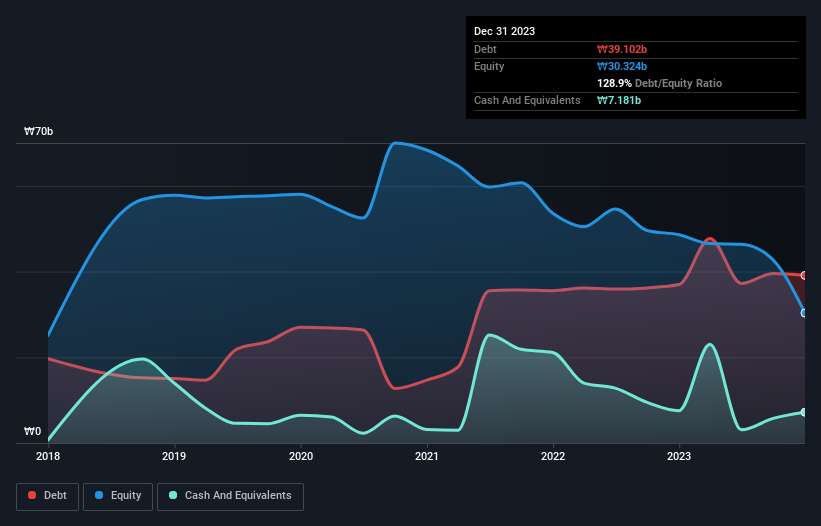
The external fund manager backed by Berkshire Hathaway's Charlie Munger, Li Lu, makes no bones about it when he says 'The biggest investment risk is not the volatility of prices, but whether you will suffer a permanent loss of capital.' So it seems the smart money knows that debt - which is usually involved in bankruptcies - is a very important factor, when you assess how risky a company is. We note that Union Korea Pharm Co., Ltd. (KOSDAQ:080720) does have debt on its balance sheet. But should shareholders be worried about its use of debt?
When Is Debt A Problem?
Debt and other liabilities become risky for a business when it cannot easily fulfill those obligations, either with free cash flow or by raising capital at an attractive price. Part and parcel of capitalism is the process of 'creative destruction' where failed businesses are mercilessly liquidated by their bankers. However, a more common (but still painful) scenario is that it has to raise new equity capital at a low price, thus permanently diluting shareholders. Of course, plenty of companies use debt to fund growth, without any negative consequences. When we examine debt levels, we first consider both cash and debt levels, together.
See our latest analysis for Union Korea Pharm
What Is Union Korea Pharm's Net Debt?
You can click the graphic below for the historical numbers, but it shows that as of December 2023 Union Korea Pharm had ₩39.1b of debt, an increase on ₩37.0b, over one year. However, because it has a cash reserve of ₩7.18b, its net debt is less, at about ₩31.9b.

A Look At Union Korea Pharm's Liabilities
Zooming in on the latest balance sheet data, we can see that Union Korea Pharm had liabilities of ₩59.0b due within 12 months and liabilities of ₩5.09b due beyond that. Offsetting this, it had ₩7.18b in cash and ₩34.3b in receivables that were due within 12 months. So its liabilities total ₩22.7b more than the combination of its cash and short-term receivables.
This deficit isn't so bad because Union Korea Pharm is worth ₩45.6b, and thus could probably raise enough capital to shore up its balance sheet, if the need arose. But it's clear that we should definitely closely examine whether it can manage its debt without dilution. The balance sheet is clearly the area to focus on when you are analysing debt. But you can't view debt in total isolation; since Union Korea Pharm will need earnings to service that debt. So when considering debt, it's definitely worth looking at the earnings trend. Click here for an interactive snapshot.
Over 12 months, Union Korea Pharm reported revenue of ₩63b, which is a gain of 3.1%, although it did not report any earnings before interest and tax. We usually like to see faster growth from unprofitable companies, but each to their own.
Caveat Emptor
Over the last twelve months Union Korea Pharm produced an earnings before interest and tax (EBIT) loss. Indeed, it lost a very considerable ₩15b at the EBIT level. When we look at that and recall the liabilities on its balance sheet, relative to cash, it seems unwise to us for the company to have any debt. So we think its balance sheet is a little strained, though not beyond repair. Another cause for caution is that is bled ₩695m in negative free cash flow over the last twelve months. So suffice it to say we do consider the stock to be risky. There's no doubt that we learn most about debt from the balance sheet. However, not all investment risk resides within the balance sheet - far from it. Be aware that Union Korea Pharm is showing 2 warning signs in our investment analysis , and 1 of those is significant...
If you're interested in investing in businesses that can grow profits without the burden of debt, then check out this free list of growing businesses that have net cash on the balance sheet.
New: AI Stock Screener & Alerts
Our new AI Stock Screener scans the market every day to uncover opportunities.
• Dividend Powerhouses (3%+ Yield)
• Undervalued Small Caps with Insider Buying
• High growth Tech and AI Companies
Or build your own from over 50 metrics.
Have feedback on this article? Concerned about the content? Get in touch with us directly. Alternatively, email editorial-team (at) simplywallst.com.
This article by Simply Wall St is general in nature. We provide commentary based on historical data and analyst forecasts only using an unbiased methodology and our articles are not intended to be financial advice. It does not constitute a recommendation to buy or sell any stock, and does not take account of your objectives, or your financial situation. We aim to bring you long-term focused analysis driven by fundamental data. Note that our analysis may not factor in the latest price-sensitive company announcements or qualitative material. Simply Wall St has no position in any stocks mentioned.
About KOSDAQ:A080720
Union Korea Pharm
Engages in the research, development, production, and sale of prescription drugs in South Korea.
Mediocre balance sheet low.
Market Insights
Community Narratives




